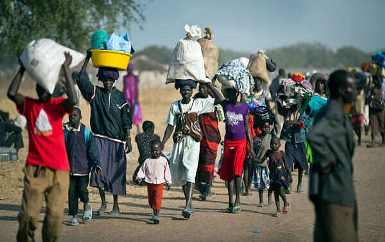MSF condemns violence in Unity state capital
April 28, 2014 (JUBA) – International medical charity Médecins Sans Frontières (MSF) has strongly condemned the “unspeakable” acts of violence that occurred in South Sudan’s Unity state capital Bentiu two weeks ago.

An MSF international team reportedly visited Bentiu last week to make an independent assessment and gather first-hand testimonies from eyewitnesses.
“What I saw in Bentiu – bodies of civilians strewn through the streets in grisly states of damage and decay, being eaten by dogs and birds – was an affront to humanity,” said Raphael Gorgeu, MSF’s head of mission in the country.
“The violence in South Sudan has taken a particularly ugly turn, stripping people of their most basic human dignity. It is a terrible thing to witness,” he added.
MSF has called on all armed actors to cease targeted killings, ensure the behaviour and accountability of fighters under their command and assume responsibility for populations in areas under their control.
The medical charity said it had received credible eyewitness accounts that up to 33 people were killed in Bentiu state hospital alone.
“MSF international staff heard tales of horrific brutality taking place on the hospital grounds from those who were present at the time,” said Christopher Lockyear, MSF’s operations manager for South Sudan.
“While patients were not specifically targeted, people who fled to the hospital in search of safety were selectively targeted based on their identities and loyalties. Once again in South Sudan, we see hospitals – places that should be protected safe havens – are increasingly places of attack and cruelty,” he added.
In a statement issued last wee, the UN Mission in South Sudan (UNMISS) said more than 200 people had died in Bentiu after the strategic town fell to opposition armed forces.
Thousands of people reportedly fled for their lives to the nearby UNMISS base, which swelled from 6,000 people to more than 22,000 within a matter of days, placing enormous pressure on aid organisations, which were not equipped to deal with such a rapid influx.
“While organisations like MSF remain committed to caring for those caught up in the conflict as best we can, we are very alarmed that the situation is spiraling out of control. The capacity of aid organisations is not limitless,” says Gorgeu.
“It remains the moral and legal responsibility of all armed actors to limit civilian casualties, facilitate humanitarian assistance and respect medical facilities. It’s time for the Opposition and Government to step up,” he added.
The world body has disclosed that over one million people have been displaced by the violence in South Sudan, with thousands said to have fled to neighbouring countries.
Fighting erupted in mid-December last year between soldiers aligned with former vice-president turned rebel leader Riek Machar and president Salva Kiir, with the latter accusing his former deputy of staging a coup to overthrow the government.
(ST)
